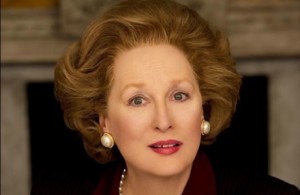The Iron Lady
Posted on January 12, 2012 at 6:43 pm
B| Lowest Recommended Age: | High School |
| MPAA Rating: | Rated PG-13 for some violent images and brief nudity |
| Profanity: | Some strong language |
| Alcohol/ Drugs: | Drinking, smoking |
| Violence/ Scariness: | Some violent images including war and terrorism |
| Diversity Issues: | A theme of the film |
| Date Released to Theaters: | January 13, 2012 |
| Amazon.com ASIN: | B0059XTUVI |
A performance by Meryl Streep of endless intelligence, skill, and sensitivity cannot keep this impressionistic portrait of Baroness Margaret Thatcher from being exactly the sort of sentimental nonsense she spent her career trying to avoid. “People don’t think anymore; they feel,” she says in this movie, with infinite disdain. “It used to be about trying to do something,” she says in an earlier scene. “Now it is about trying to be someone.” This film recognizes her point of view but then comes down on the side of feelings and of being rather than doing.
Margaret Thatcher was one of the most influential and polarizing figures of the last half-century. She was the first woman to serve as the British Prime Minister and she held the position for an extraordinary and transformational decade that included highly controversial privatization initiatives, major reductions in the power of unions, and a brief war with Argentina over the Falkland Islands.
Based on this film, however, one would conclude that she is a dotty old lady who was once fierce, peremptory, and ambitious, but now cannot quite remember what it was all about. It is always a relief to be spared the usual biopic structure of highlighted anecdotes as a shorthand explanation for the person’s motives and fears, followed by assorted personal and professional high and low points, all conveniently assembled to create the illusion that lives can be neatly dissected. But, as with “J. Edgar” a few months ago, this film goes too far in the other direction, leaving us with an unreliable, subjective approach. A movie about a real life should not pretend to be definitive, but it should be illuminating.
Streep is truly magnificent, creating a vibrant character of passion and strength and her scenes with Jim Broadbent as Thatcher’s supportive husband are touching. But without some sense of what made her so passionate and how she formed her ideas about economics and foreign policy it’s just a less glamorous version of “My Fair Lady.” A young woman is literally groomed for success, her hair shellacked into an intimidatingly immobile helmet, her voice lowered, her accent raised. Without a “why,” though, it’s just a trip to the ball. It is a shame that a film produced and directed by women takes such a diminished view of Thatcher, reducing the scope of any doubts or regrets she might have at the end of her life to house and home and overlooking the fierce engagement with ideas that was truly her core.










